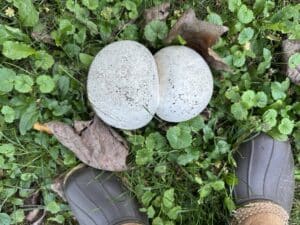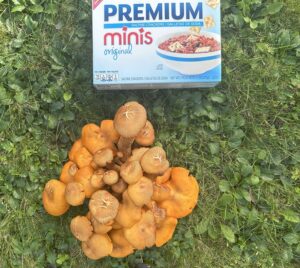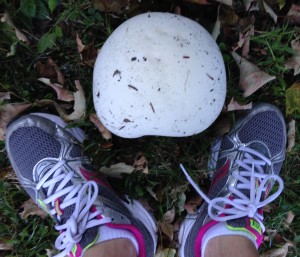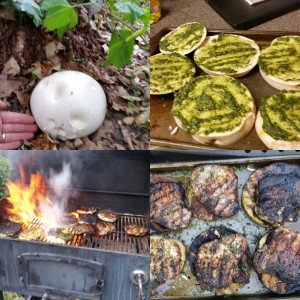Hello, fellow lovers of all things green. As dry as our weather has been, there’s been some fascinating and fun fall fungi that have shown up in our lawns, including Giant Puffball Mushrooms, which are intriguing and edible. I harvested conjoined twin giant puffballs before cutting the lawn, thinking I’d cook them. Meanwhile, a client sent photos of a cluster of bright orange mushrooms the size of a cracker box that suddenly popped up in the lawn.
“Do you know what these are?”

Giant Puffball Mushrooms (Calvatia gigantea)
I asked my go-to for all things in nature, Dennis Briede of Blairstown, and he quickly wrote back that “it looks like a Jack-o’-Lantern mushroom,” adding “they claim the young ones glow in the dark.” How cool is that?
But unlike the Giant Puffballs, Jack-o’-Lantern mushrooms (Omphalotus olearius) are poisonous to humans, dogs, and cats, causing severe cramps, vomiting, and diarrhea. I suggested Peggy put them in a bag and toss them in the trash.

Jack-o’-Lantern Mushroom (Omphalotus olearius)
“I will definitely toss them as they are way too interesting to the dogs.”
My Neighbor Bill at his Volleyball
I sent her photos of my giant mushroom, along with the link to an earlier story that starts with:
My neighbor Bill ate his volleyball – a Giant Puffball Mushroom, that is. I have a volleyball, too, that I’ve been watching in amazement. Eating it didn’t occur to me, but it turns out they are delicious.
“Still, I’m not sure I will eat them.”
“Good call,” Peggy wrote back.
I’ve always admired folks who know what they’re doing, scavenging for wild mushrooms. Mushrooms are the fruit of valuable spores that decay organic material and recycle nutrients into the soil. There are several thousand varieties. And while most are technically edible, many are not pleasant to eat, and up to 250 varieties are considered significantly poisonous. That’s enough for me to stay clear of scavenging!
The ‘Foolproof Four’ for first-time foragers

My Volleyball Mushroom
But the Giant Puffball Mushroom is easy to find and hence one of the ‘foolproof four’ for beginner wild mushroom enthusiasts to feast on per Cabinlife.com. There are Morels (Morchella species) with their classic conical cap with honeycombed ridges, which folks adore. They are short-lived and rare to find. Then there are Chicken Mushrooms (Laetiporus species) that look like overlapping orange ears that grow on decaying logs. The final of the ‘foolproof four’ is Yellow Chanterelles (Cantharellus cibarius) with yellowish to pale orange smooth caps.
Giant Puffball Mushrooms (Calvatia gigantea) are found in the fall, growing in open areas such as grassy fields, lawns, and near roads. They’re hard to miss because of their size, but beware of a few poisonous look-a-likes. The look-alikes don’t grow as large, so harvesting a volleyball-sized one is a safe bet.
Some think mushrooms are vegetables, but they’re a fungus packed with vitamins and minerals that boost energy levels and lower cholesterol. Many contain enzymes and antioxidants that help your immune system. Some mushrooms aid in arthritis and inhibit diabetes, and prevent cancer. They’re low in calories; best of all, wild mushrooms are free!

Bill’s Feast
How to cook Giant Puffball Mushrooms
Giant Puffball Mushrooms are tasty when the flesh is firm and white on the inside and out, but use them within a day or two after harvest. Once they turn yellow or greenish, they can cause an upset stomach. In maturity, the inside of the puffball turns into a huge bag of green spores – hence why the common name is Giant Puffball.
The skin of the Giant Puffball is leathery but easy to peel off before cooking. To prepare, slice them into quarter or half-inch slabs. You can lightly season with salt and pepper, then sauté in oil or butter until both sides are golden brown. Or, coat with a milk and egg wash before dusting with seasoned flour, then fry. You can also dice the puffball and add it to soups, rice, or risotto dishes.
Bill pureed his in basil, olive oil, garlic, salt, and pepper. He also said, “You could do the balsamic, rosemary, garlic, olive oil go-to marinade for mushrooms.” Gee Bill, you’re not only a fun guy but a fungi connoisseur (I couldn’t resist).
I considered cooking the puffballs on the grill last night, but they had already softened a bit. Unless a foraging expert, maybe it’s best to let mushrooms just be and marvel at how they decompose organic matter, bringing nourishment back into our dear earth while creating more spores to produce new mushrooms– they are part of the “Wood Wide Web” (click the podcast link below to learn more.)
Garden Dilemmas? AskMaryStone@gmail.com and your favorite Podcast App.
There’s more to the story in the Garden Dilemmas Podcast:
Cabin Life.com’s The Foolproof Four: Edible Wild Mushrooms
Another fascinating fungus – Fairy Rings

Dennis Briede sharing insights and antics of his meadow wildlife.
Other Stories that feature Dennis Briede:
Episode 100 Antics of Meadow Wildlife
Antics of Meadow Wildlife – Blog Post
Ep 101. Woodcock Dance-Making a Meadow
Woodcock Dance – Making a Meadow – Blog Post


